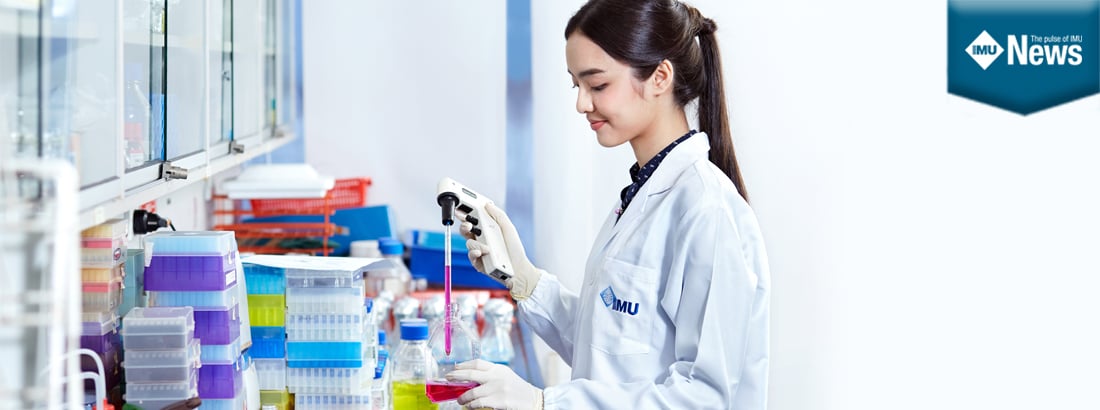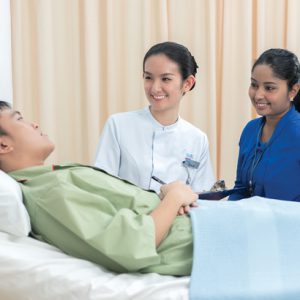Biotechnology is a multidisciplinary field that employs biological system to produce useful products for the enhancement of life and wellbeing. As such, medical biotechnology harnesses the related fields specifically for the improvement of human health. In the attempt to detect, treat and combat the spread of the Covid-19 infection, medical biotechnologists are the scientists who have been the backbone of the heroic chain in support of the front liners from the medical and healthcare team. With good detection methods, effective treatment and prevention, the multiplication of infection will eventually come to halt.  The recent pandemic of Covid-19 outbreak has brought scientists of various disciplines around the world to immerse themselves in researches revolving around battling the infection, starting from developing identification test kits to the therapeutics to treat and effective vaccines to prevent further infections. The studies involved extensive network among scientists to bring the novel therapeutics and vaccines from bench to bed which requires enormous amount of money to fund the research activities. Virologists, molecular biologists, pharmaceutical chemists and data scientists, alongside with the medical experts are among those working within their expertise and later merge their findings collaboratively in order to materialise innovations necessary in the battle against Covid-19. Hence, medical biotechnologists are scientists well equipped with knowledge and skills in a wide variety of disciplines including those mentioned above, who are deemed to be advantageous in leading the biopharmaceutical innovators in providing insights and solutions to emerging health threats. The role of medical biotechnologists undoubtedly has a huge impact.
The recent pandemic of Covid-19 outbreak has brought scientists of various disciplines around the world to immerse themselves in researches revolving around battling the infection, starting from developing identification test kits to the therapeutics to treat and effective vaccines to prevent further infections. The studies involved extensive network among scientists to bring the novel therapeutics and vaccines from bench to bed which requires enormous amount of money to fund the research activities. Virologists, molecular biologists, pharmaceutical chemists and data scientists, alongside with the medical experts are among those working within their expertise and later merge their findings collaboratively in order to materialise innovations necessary in the battle against Covid-19. Hence, medical biotechnologists are scientists well equipped with knowledge and skills in a wide variety of disciplines including those mentioned above, who are deemed to be advantageous in leading the biopharmaceutical innovators in providing insights and solutions to emerging health threats. The role of medical biotechnologists undoubtedly has a huge impact.

Development of a rapid detection kit with high sensitivity and specificity which can detect patients at different infection stages, symptomatic and asymptomatic is an example of biotechnological application. In the pressure of time to curb the pandemic, production of Covid-19 vaccines would need to be expedited and biotechnology companies such as Moderna, Innovio and Novavax have stepped in; together with academic and other research institutions like the University of Queensland, Imperial College London and University of Hong Kong, to name a few. A notable increase in Research and Development activities to improvise existing antiviral drugs and to produce novel drugs are widely reported and publicised. This shows that Medical Biotechnology not only contributes significantly to continuously improve health, but also opens wide opportunities for entrepreneurial revenue that generates billions of dollars to the economic growth. The journey travelled in the battle against Covid-19 starts with the understanding of viral properties which includes rapid sequencing of the viral genome. This is fundamental to facilitate the development of diagnostic tests and for research into therapeutics and vaccines. Concurrently, the clinical spectrum of the disease continues to be defined and evaluation of treatments follow suit. This explains why most therapeutics and vaccines take between five to ten or sometimes more years to be brought to market, after mandatory clinical trials which happen in stages. All in all, taking the product from bench to bed to market does require an addition of entrepreneurial knowledge. An IMU Medical Biotechnology graduate certainly fits into the global current needs as its curriculum is designed in such a way that it stays relevant to the global healthcare scene.
| The 2020 curriculum |
|---|
| The IMU’s Bachelor of Science (Hons) in Medical Biotechnology Programme Educational Objectives are aiming to produce biotechnologists who are able to apply fundamentals and advanced concepts underlying the emergent fields with transferable, interpersonal and bio-entrepreneurial skills to transform research outcomes into industrial opportunities. The new curriculum stands tall with solid fundamentals weaving through advanced biotechnology components such as Advanced Data Analytics, Omics Technology, Molecular Medicine, Science Communication, Management and Experimentation on Animals modules. The curriculum also includes diverse elective modules that gear towards the demands of the current biotechnology and healthcare industries particularly in the field of data science and business while enhancing the existing research components. The electives include Algorithms and Data Structure; Medical Epidemiology and Public Health; Research and Commercialisation in Biotechnology; Business Management; Fundamentals of Cosmeceuticals; Biopharming: Harvesting Therapeutics; Functional Foods, Nutraceuticals and Supplements. |
Henceforth, Medical Biotechnology is a well-demanded field. The biotechnologists are the backbone who deserve plausible recognition for their contributions in the enhancement of health and well-being, without whom a healthcare system would not only be incomplete but also unable to catch up with the ‘smart’ living enemies like viruses.
Written by Prof Shar Mariam Bt Mohamed









